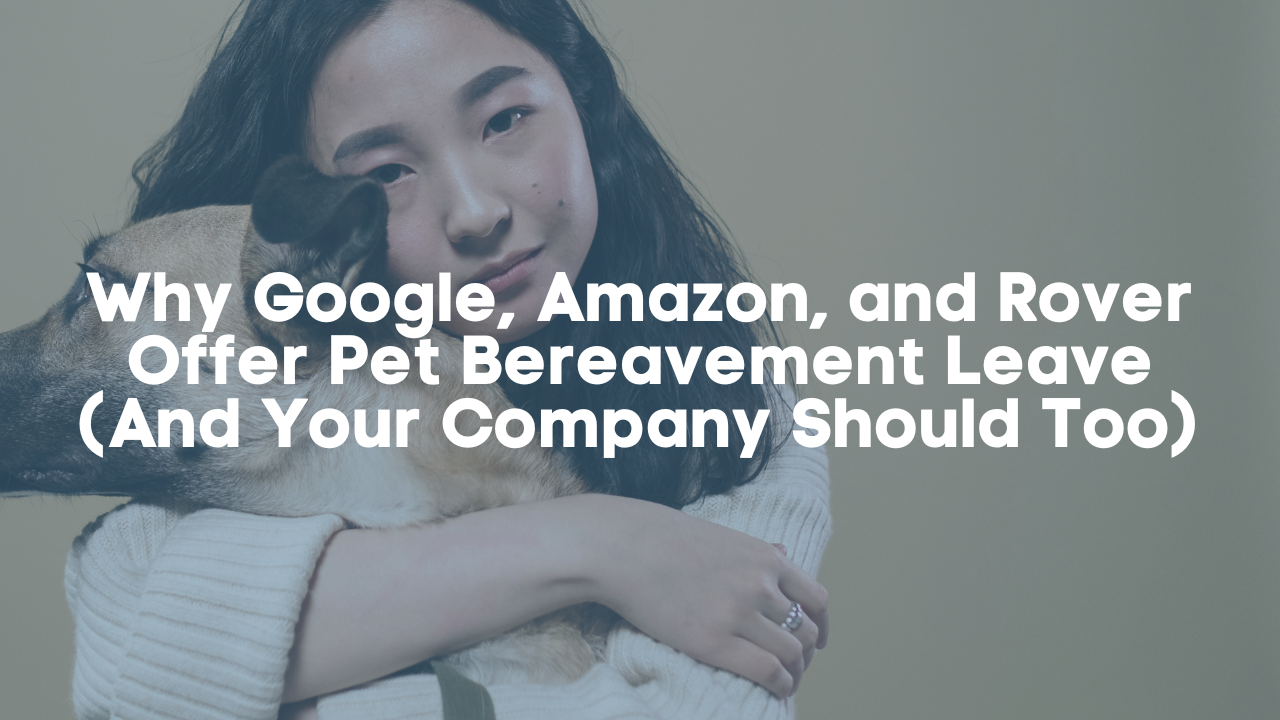Why Google, Amazon, and Rover Offer Pet Bereavement Leave (And Your Company Should Too)
Jun 08, 2025
Your employee's dog died yesterday. Today, they're sitting in your office asking for time off, apologizing for being "dramatic," and offering to use vacation days because they know pets "don't count" under your bereavement policy.
Here's what they're not telling you: They haven't slept, they can barely focus, and they're dreading going home to an empty house where their dog's bed still sits by the door.
And here's what most companies don't realize: 97% of pet owners consider their pets family members. When these employees lose a pet, they're grieving a family member. Yet most workplace policies act like this grief doesn't exist.
The forward-thinking companies? They're already ahead of the curve.
Some companies figured this out already. Google, Amazon, Whole Foods, and Starbucks let employees bring pets to work because they know it reduces stress and makes people happier. 70% of pet owners are more productive when their pets are around. Turns out, unconditional love is good for focus.
Rover, Trupanion, Kimpton Hotels, and Mars Inc. go further with actual pet bereavement leave – 2-5 paid days to process loss without burning vacation time.
Why This Matters
This isn't about being the "cool" company or pandering to millennials. It's about recognizing reality: 1 in 3 people grieve their pets for at least six months, and grief-related issues already cost companies $75 billion annually.
When employees have to hide their pet grief, you get people who:
-
Can't concentrate but are pretending they're fine
-
Use sick days dishonestly because they have no other option
-
Resent a workplace that doesn't see them as whole humans
-
Leave for companies that do get it
The employees who get real support through pet loss? They become your biggest advocates. They stay longer, work harder when they're present, and tell other people what it's like to work somewhere that actually cares.
Your employees’ grief about their pet is real grief. It's not less important because it's not a human. It's not something they should "get over" quickly. And it's definitely not something they should have to hide at work.
How to Make This Happen For Your Employees:
-
Start small. Don't try to revolutionize everything at once. Pet bereavement leave is an easy win – low cost, high impact.
-
Get specific with your policy. "Immediate family pets" (pets living in the employee's household) covers what matters without opening weird loopholes. Set annual limits if you're worried about abuse, but honestly, most people aren't losing multiple pets every year.
-
Train your managers. Give them actual words to use: "I'm sorry for your loss. Take what you need." That's it. No awkward comments about getting another dog or questions about whether it was "really that close" to the pet.
-
Handle the eye-rollers. Every workplace has people who think pet grief is ridiculous. Your response: "We support our employees through difficult times. Period." Don't justify or over-explain.
-
Make the process simple. Nobody should have to write a formal request while they're crying about their cat. One conversation, maybe a simple email. Done.
What to Say:
When someone asks for pet bereavement leave:
-
"I'm so sorry for your loss. Take the time you need."
-
"Let me know how we can help with your workload."
-
"There's no rush – come back when you're ready."
What not to say:
-
"It was just a pet."
-
"Maybe this is a good time to get a new one."
-
"Are you sure you need three whole days?"
When other employees complain:
-
"This policy ensures everyone has the time to get support when they need it."
-
"We value the whole person, not just the work they produce."
Don't apologize for caring about your people. Don't make it weird by over-explaining pet psychology. Just be human about it.
If Your Company Doesn't Offer Pet Bereavement Leave Yet
When you need time off for pet loss: Don't apologize for your grief.
Try: "I need to take [X days] of bereavement leave for my dog who passed away yesterday. I can use PTO if needed, but wanted to let you know what's happening." Be matter-of-fact about it. Your grief is valid whether your company recognizes it or not.
How to ask for the policy to be added: Approach HR or your manager with the business case, not just the emotional one.
Try: "I've been researching companies that offer pet bereavement leave – like Google, Amazon, and Rover – and I think it could be a valuable addition to our benefits. It's low-cost but shows employees we support them through major life events. Would you be open to exploring this?"
Share this article if it helps make the case.
Remember: You don't have to justify your grief to anyone. Pet loss is real loss, and if your workplace doesn't see that yet, the problem isn't with your feelings; it's with their policies.
The Bottom Line
Pet bereavement leave shouldn’a luxury benefit, it's basic recognition that your employees are humans with lives and relationships outside of work. Some of those relationships happen to have four legs and unconditional love.
The companies that figure this out first will get the best people. The ones that don't will keep wondering why good employees leave for "better opportunities" – not realizing that sometimes "better" just means "treats me like a person."
Your choice.
Join the Grieve Leave movement
Share your info to join our Grieve Leave community. You don’t want to miss anything!


